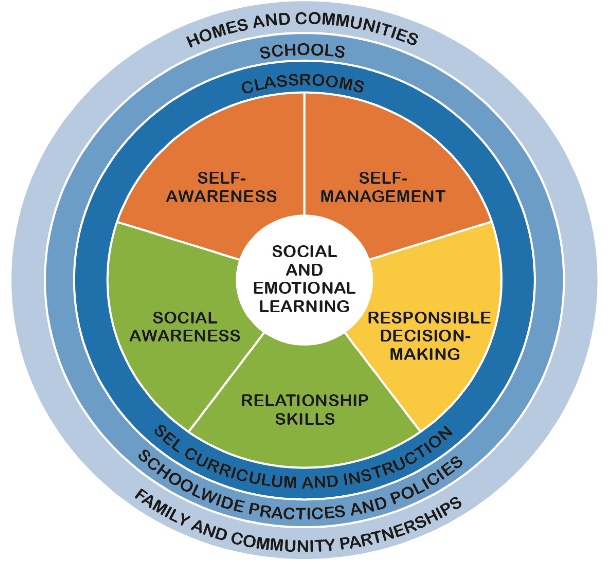Social-Emotional Learning & Crew Block At DDES
All of our students begin their day with Crew – a block of day used to connect, build relationships, and engage in social-emotional skill-building. We ground our Character work in “The Way of the Blue Bear”, our school-wide character traits. Our goal is to bring these traits to life for students by explicitly teaching social-emotional skills needed to show Compassion, Courage, Self-Discipline, Tenacity and Craftsmanship. During Crew Block and throughout the day, students are given an opportunity to practice and reflect on Character Traits and SEL Skills. We expect that DDES students not only know the traits and what they mean, but also know their own relative areas of strength and need for character growth. We – students and staff members – champion a growth mindset, which means that we know character can grow through effort. In the words of one of our students, a growth mindset can be thought of simply as adding “yet” to the end of a sentence – such as “I can’t do that, yet.”
We have grounded our Crew Block Instruction in research-based Casel Social-Emotional Competencies as a foundation to develop units and developmentally appropriate learning targets for each grade-level. Click on the scope & sequence below to see how targets build across each grade level!
CASEL’S SEL FRAMEWORK

THE CASEL 5
SELF-AWARENESS
The abilities to understand one’s own emotions, thoughts, and values and how they influence behavior across contexts. This includes capacities to recognize one’s strengths and limitations with a well-grounded sense of confidence and purpose. Such as:
• Integrating personal and social identities
• Identifying personal, cultural, and linguistic assets
• Identifying one’s emotions
• Demonstrating honesty and integrity
• Linking feelings, values, and thoughts
• Examining prejudices and biases
• Experiencing self-efficacy
• Having a growth mindset
• Developing interests and a sense of purpose
SELF-MANAGEMENT
The abilities to manage one’s emotions, thoughts, and behaviors effectively in different situations and to achieve goals and aspirations. This includes the capacities to delay gratification, manage stress, and feel motivation & agency to accomplish personal/collective goals. Such as:
• Managing one’s emotions
• Identifying and using stress-management strategies
• Exhibiting self-discipline and self-motivation
• Setting personal and collective goals
• Using planning and organizational skills
• Showing the courage to take initiative
• Demonstrating personal and collective agency
SOCIAL AWARENESS
The abilities to understand the perspectives of and empathize with others, including those from diverse backgrounds, cultures, & contexts. This includes the capacities to feel compassion for others, understand broader historical and social norms for behavior in different settings, and recognize family, school, and community resources and supports. Such as:
• Taking others’ perspectives
• Recognizing strengths in others
• Demonstrating empathy and compassion
• Showing concern for the feelings of others
• Understanding and expressing gratitude
• Identifying diverse social norms, including unjust ones
• Recognizing situational demands and opportunities
• Understanding the influences of organizations/systems on behavior
RELATIONSHIP SKILLS
The abilities to establish and maintain healthy and supportive relationships and to effectively navigate settings with diverse individuals and groups. This includes the capacities to communicate clearly, listen actively, cooperate, work collaboratively to problem solve and negotiate conflict constructively, navigate settings with differing social and cultural demands and opportunities, provide leadership, and seek or offer help when needed. Such as:
• Communicating effectively
• Developing positive relationships
• Demonstrating cultural competency
• Practicing teamwork and collaborative problem-solving
• Resolving conflicts constructively
• Resisting negative social pressure
• Showing leadership in groups
• Seeking or offering support and help when needed
• Standing up for the rights of others
RESPONSIBLE DECISION-MAKING
The abilities to make caring and constructive choices about personal behavior and social interactions across diverse situations. This includes the capacities to consider ethical standards and safety concerns, and to evaluate the benefits and consequences of various actions for personal, social, and collective well-being. Such as:
• Demonstrating curiosity and open-mindedness
• Identifying solutions for personal and social problems
• Learning to make a reasoned judgment after analyzing information, data, facts
• Anticipating and evaluating the consequences of one’s actions
• Recognizing how critical thinking skills are useful both inside & outside of school
• Reflecting on one’s role to promote personal, family, and community well-being
• Evaluating personal, interpersonal, community, and institutional impacts

